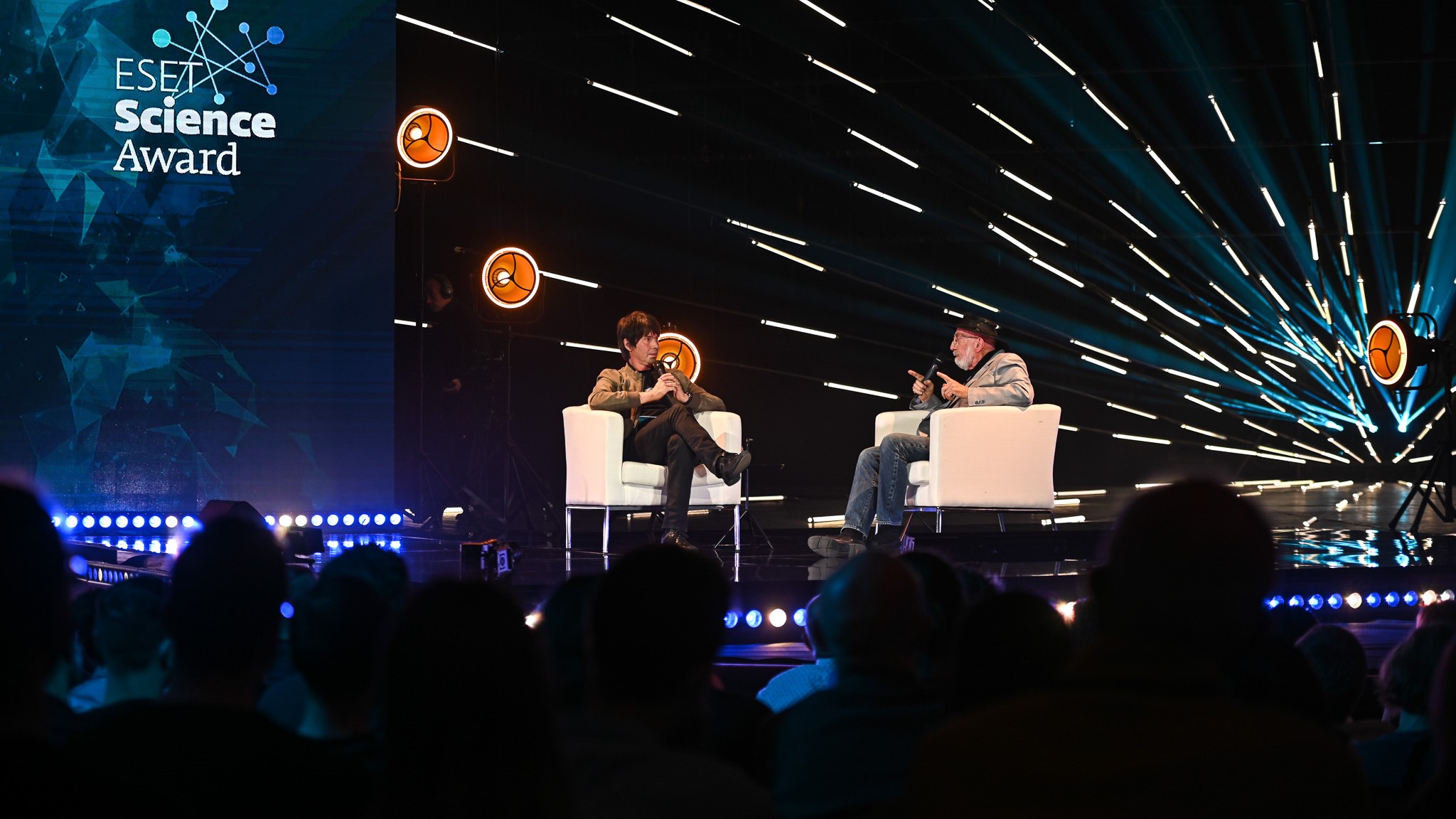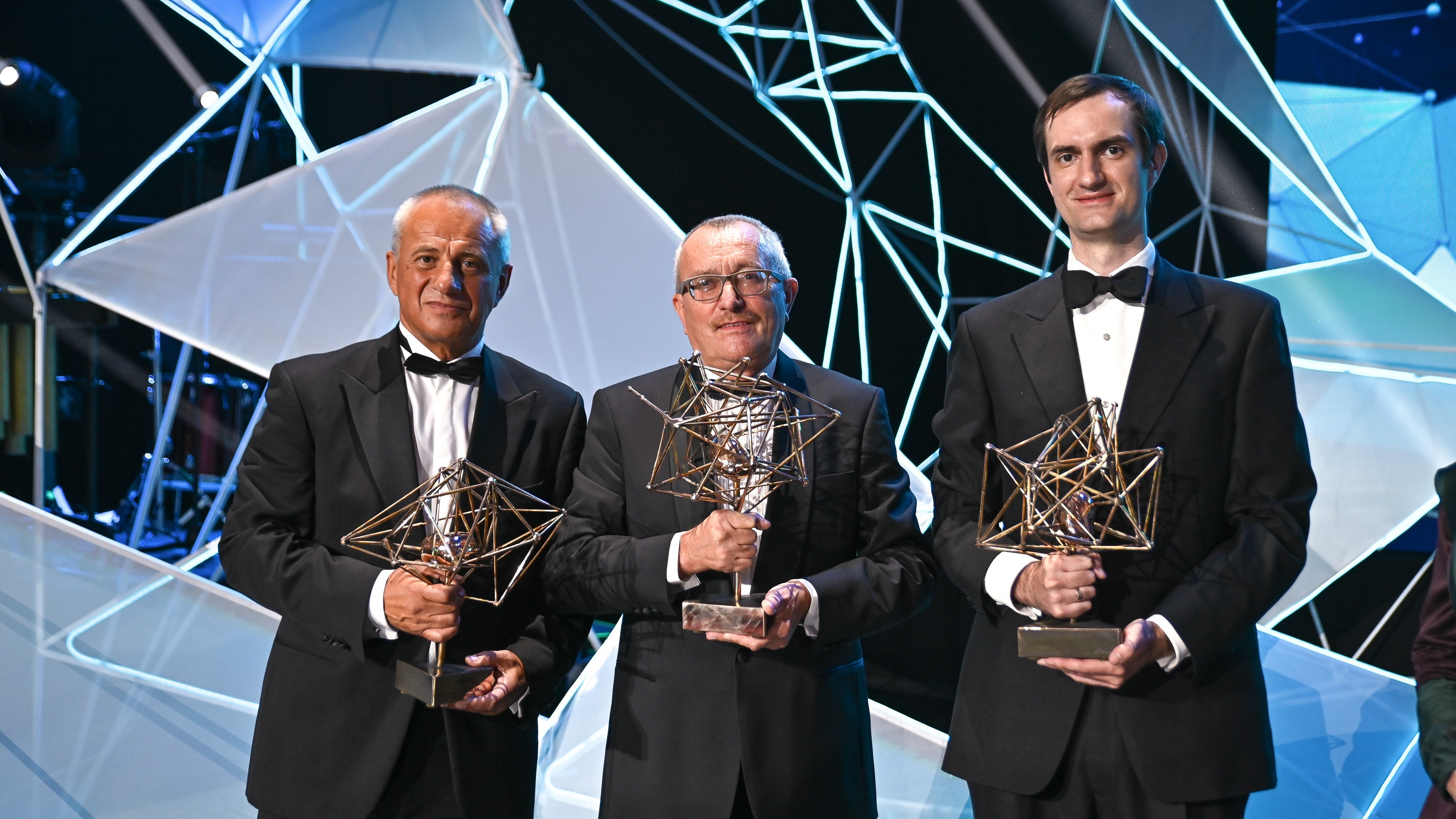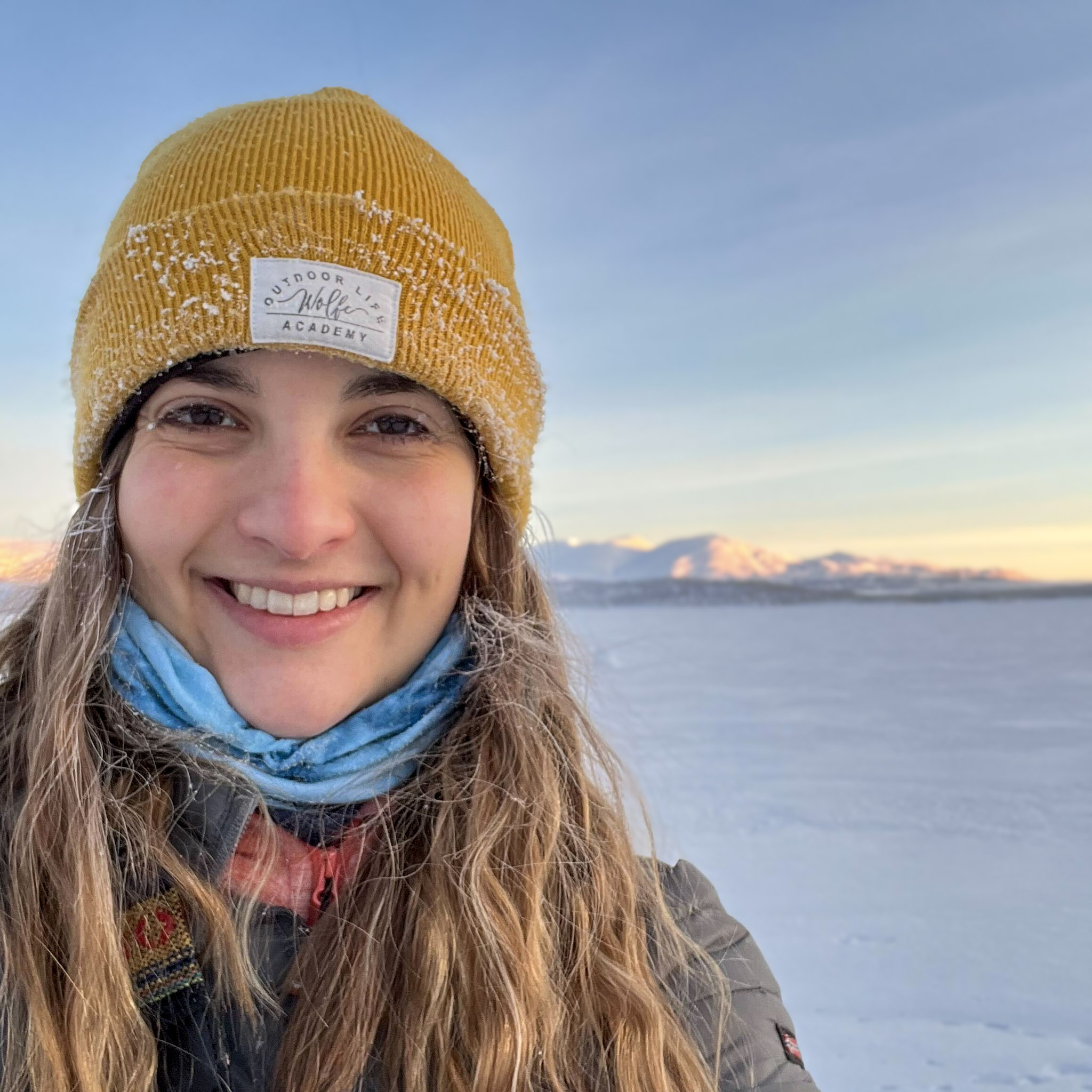ESET Science Award 2021 winners announced
The ESET Science Award honors exceptional personalities of Slovak science.

- 2021 ESET Science Award winners
- Outstanding Individual Contributor to Slovak Science Award: Ján Dusza
- Outstanding Young Scientist in Slovakia under the age of 35 award: Ladislav Valkovič
- Outstanding Academic: Jozef Zajac
- The ESET Foundation
- Previous ESET Science Award laureates
- ESET Award laureate selection: The jury
- ESET
- Additional resources:
This year's ESET Science Award laureates were announced on October 16 at a prestigious gala dinner. Material physicist Ján Dusza received the Outstanding Individual Contributor to Slovak Science Award 2021, Ladislav Valkovič won the Outstanding Young Scientist in Slovakia under the age of 35 award, and Jozef Zajac received the award in the Outstanding Academic category.
The laureates are selected by an international jury of renowned scientists, chaired by physics Nobel Prize Laureate, Professor Kip Thorne for the past two years. "The selection of laureates was extremely challenging this year. This confirms that science in Slovakia has an international quality," Thorne said in a statement.
This year's winners were announced on Oct. 16 at a gala dinner attended by the President of the Slovak Republic, Zuzana Čaputová and Slovak Prime Minister Eduard Heger. The gala concluded a week of science celebrations including a thought-provoking discussionbetween Professor Kip Thorne and Professor Brian Cox on Oct. 12 in the National Theatre in Bratislava.
Related: Time Travel and Wormholes: Physicist Kip Thorne's Wildest Theories

The ESET Science Award stands as a testament to Slovak scientific achievements and exceptional individuals. It has been granted by the ESET Foundation annually since 2019 and boasts an impressive collection of winners across different scientific disciplines.
2021 ESET Science Award winners
The laureates of all three categories are carefully chosen based on a rigorous selection process that takes into consideration scientific research results and publications, measurable scientific data, their roles in science communication, collaborations with other scientific disciplines as well as feedback from collaborators and students, to name but a few.
Outstanding Individual Contributor to Slovak Science Award: Ján Dusza
Material physicist Ján Dusza has dedicated his life to the research and development of ceramic materials. He currently works at the Institute of Materials Research of the Slovak Academy of Sciences (SAS) in Košice and is a co-founder and head of the PROMATECH Research Center in Košice. Advanced ceramic materials are good candidates for challenging applications, as they are able to withstand demanding temperatures. As such, ceramics are used in gas turbine blades, internal combustion engine valves as well as ball bearings.
Get the Space.com Newsletter
Breaking space news, the latest updates on rocket launches, skywatching events and more!
Dusza is an extremely talented individual who loves his job "It's a fantastic thing to be able to do your hobby your whole life," Dusza said in a statement. "Let's not forget that everything around us, except nature, is here thanks to basic research." He's an inspiration to many but remains remarkably modest about his achievements.
Outstanding Young Scientist in Slovakia under the age of 35 award: Ladislav Valkovič
Metabolic imaging scientist Ladislav Valkovič researches and develops non-invasive methods for measuring tissue metabolism using magnetic resonance imaging (MRI). Valkovič works at the Institute of Measurement of the Slovak Academy of Sciences (SAS) in Bratislava and at the Oxford Centre for Clinical Magnetic Resonance Research at Oxford University. Valkovič's attention has recently been focused on the heart and how detecting changes in metabolism could help detect structural changes that may not be visible. Such methods are currently being researched to gain an understanding of how external stimuli such as drugs may affect organ functioning and response.
The influential scientist's research hopes his work will soon help doctors at work and considers the development of the rapid method of measuring metabolic processes in muscle to be his greatest achievement to date.
"Precisely because science is so difficult in Slovakia, the people who do it are real enthusiastic experts and it is a pleasure to work with them," said Valkovič in a statement.
Outstanding Academic: Jozef Zajac
Progressive manufacturing technologies scientist Jozef Zajac has worked in various multinational engineering companies and now inspires his students to strive for excellence. He is the dean of the Faculty of Production Technologies of the Technical University in Košice where he deals with the topic of progressive production technologies.
"I tell students that the harder their studies are, the easier it will be for them to find work," said Zajac in a statement.
The motivating academic believes that professors who do not practice science do not belong in universities. His expert knowledge and ability to solve practical problems inspire his students to gain practical experience during their studies to enhance their career prospects. A method that evidently works as his faculty achieves up to 99% success rate in employing graduates within three months of graduation.

The remarkable individuals are celebrated both for their scientific accomplishments and the impact they have on society.
"The laureates, as well as the finalists of the ESET Science Award, repeatedly prove the world-class level of science in Slovakia," Richard Marko, CEO of ESET said in the same statement. "Today, society faces major global challenges, including spreading misinformation and mistrust in science and its results. However, our confidence in scientists remains strong and we are happy to continue to support their work. We believe that scientists and scientific knowledge are moving our country forward."
The celebration of science is also enjoyed by the general public, who could select their own laureate through an online vote promoted on National TV. This year the public vote was awarded to Katarína Mikušová, a biochemist whose research is helping fight the infectious disease tuberculosis.
The value of the ESET award is internationally recognized across the spectrum of international society.
"I applaud ESET Science Award, a private initiative to support excellence in research and education" Roger Penrose, 2020 Nobel Prize laureate. "It is a very important encouragement for science in Slovakia."
The ESET Foundation
The prestigious ESET Science Award would not be possible without the support of academics and scientists around the world. The award has been granted by the ESET Foundation annually since 2019. The ESET Foundation was established in 2011 with the primary goal of developing education in information technology, internet security and raising awareness and popularity of science and research. Since its establishment, the foundation has spent over €3 million (£2.5 million) supporting over 600 projects. In 2018, the foundation announced it would be focussing on supporting solutions to societal problems, with an emphasis on improving education and building a better civil society.
The ESET Science Award also relies on talented ambassadors to support this inspiring venture. Robotics and artificial intelligence specialist Ruzena Bajcsy, photonics and integrated optics researcher, Pavel Cheben, chemists and philanthropes Hana and Dalimil Dvořák and machine learning scientist Michal Valko all support the ESET Science Award and help to raise awareness of the opportunities available to Slovak scientists.
Previous ESET Science Award laureates
The ESET Science Award has been running for three years and has acknowledged some remarkable Slovak scientists since it was established in 2019.
Outstanding Individual Contributor to Slovak Science Award
Fedor Šimkovic (2020)
Nuclear and subnuclear physicist Fedor Šimkovic works at the Department of Nuclear Physics and Biophysics, Faculty of Mathematics, Physics and Informatics, Comenius University in Bratislava. Part of his work focuses on neutrinos — the most widespread elementary particles in the universe.
Ján Tkáč (2019)
Biotechnology researcher Ján Tkáč studies glycans in a bid to help diagnose various oncological diseases, including early diagnosis of prostate cancer.
Outstanding Young Scientist in Slovakia under the age of 35 award
Tamás Csanádi (2020)
Material scientist Tamás Csanádi develops structural ceramics and researches their possible application in industry. "Ceramics could be a great alternative to metals - but we need to figure out how to improve its deformation behaviour." Csanádi said in a statement.
Ľubomíra Tóthová (2019)
Biomedical scientist Ľubomíra Tóthová investigates how saliva can be used to not only diagnose diseases but also help resolve kidney disorders and urinary tract infections. Tóthová claims "Discoveries don't wait - they come to us on a daily basis".
Outstanding Academic
Ivan Varga (2020)
Biomedical researcher Professor Ivan Varga works at the Department of Histology and Embryology, Faculty of Medicine, Comenius University in Bratislava. He believes that anatomy, histology and embryology are the basic pillars of biomedical research, as well as the future doctors' and dentists' subjects of study. His research team was one of the first to describe the wide lymphatic spaces in the wall of the fallopian tubes.
Tomáš Vinař (2019)
Bioinformatics Professor Tomáš Vinař is interested in how the development of artificial intelligence will impact society and what new opportunities it may create for people. Vinař believes his role as a university professor not only is about passing on knowledge to students but also about encouraging them to discover what hasn't been explored before.
ESET Award laureate selection: The jury
Each year, the difficult job of selecting the laureates falls to an international jury. The chairman for the last two years has been Kip Thorne, his predecessor was Nobel Prize Laureate Erwin Neher who chaired the first ESET Science Award in 2019.
Chairman
Kip S. Thorne (2020 & 2021)
American physicist and 2017 Nobel Prize laureate famed for his work in gravitational physics and astrophysics.
Erwin Neher (2019)
German biophysicist and 1991 Nobel Prize laureate for his development of the patch clamp technique for recording ion channel activity, together with Bert Sakmann.
Jury Members
Fiona Watt (2020 & 2021)
British scientist focusing on cutting edge stem cell research.
Hana Dvořáková (2020 & 2021)
Czech chemist pioneering AIDS research.
Ralf Riedel (2020 & 2021)
Material scientist focusing on the synthesis of advanced ceramics and novel inorganic nitride-based materials.
Tibor Krisztin (2020 & 2021)
Hungarian mathematician leading work on dynamical systems and differential equations.
Rolf-Dieter Heuer (2020)
German experimental particle physicist studying electron-positron reactions, development of experimental techniques, as well as construction and running of large detector systems.
Ursula Keller (2019)
Swiss physicist primarily focussed on ultrafast laser technology.
Carl-Philipp Heisenberg (2019)
German biologist pioneering research in the field of embryonic development of vertebrates.
Christopher Csíkszentmihályi (2019)
American artist and technologist whose work helps teach people about an ethical life in technology.
ESET
For over 30 years ESET has remained at the forefront of IT security, developing software and services to protect businesses and consumers worldwide. ESET continues to fight evolving threats in cyber security to enable the safe use of technology.
Additional resources:
- If you are interested in nominating yourself or someone else for the ESET Science Award you can find the statute here on the award website.
- Read more about the numerous partners involved in the ESET Science Award.
- Watch this video of Professor Kip Thorne and Professor Brian Cox discussing whether science is the solution to everything.
Join our Space Forums to keep talking space on the latest missions, night sky and more! And if you have a news tip, correction or comment, let us know at: community@space.com.

Daisy Dobrijevic joined Space.com in February 2022 having previously worked for our sister publication All About Space magazine as a staff writer. Before joining us, Daisy completed an editorial internship with the BBC Sky at Night Magazine and worked at the National Space Centre in Leicester, U.K., where she enjoyed communicating space science to the public. In 2021, Daisy completed a PhD in plant physiology and also holds a Master's in Environmental Science, she is currently based in Nottingham, U.K. Daisy is passionate about all things space, with a penchant for solar activity and space weather. She has a strong interest in astrotourism and loves nothing more than a good northern lights chase!
